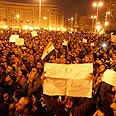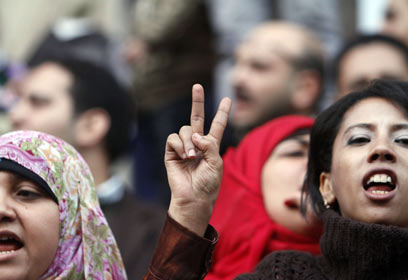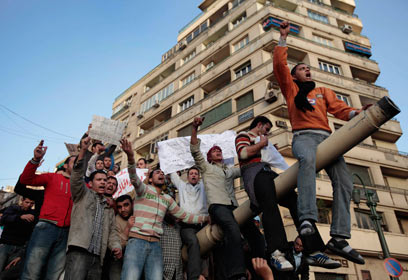
Mubarak wants talks with opposition
Meanwhile, protesters camped out in Tahrir Square vow to stay until Mubarak is ousted, despite promises for economic, political reform, and El Al flight from Cairo brings dozens of Israelis home. 'We witnessed revolution live,' says one
Egyptian President Hosni Mubarak ordered his government to begin talks with the opposition parties backing the uprising against him, Al-Arabiya reported Monday.
Mubarak told incoming Prime Minister Ahmed Shafiq to lead the state towards democracy through dialogue and to return faith to the economy.
"We must progress in general, quickly and effectively, towards political, legal, and parliamentary reform through dialogue with all parties that aspire to operate in the democratic arena," he was reported as saying. Mubarak also ordered the government to reduce inflation and earmark funds for "support of the underclass".
Meanwhile an El Al flight carrying dozens of Israeli tourists from Cairo landed in Ben Gurion International Airport Monday morning, having fled the uprising in Egypt.
Emily, a US citizen who works in Egypt, came to stay with relatives in Israel. She described total chaos. "There are no policemen in the streets, just a few tanks. At night people loot, and there was a lot of fear. I knew I should come back, and I'm glad I have a safe place to return to like Israel," she said.
In Arabic, she added, "The Egyptian government and President Hosni Mubarak are oppressing the citizens." However she said she does not believe Mubarak will fall from power anytime soon.
Some Israelis were shocked by what they had seen, vowing never to return to Egypt. But Moshe, from Jerusalem, was excited. "I may not have gotten to travel much, but I witnessed a revolution live and I'm not sorry. It's something you don't see every day."

Seventh day of protests begins Monday (Photo: AFP)
'Army must choose: Egypt or Mubarak'
As the sixth day of protests came to an end Sunday night, Egyptian protesters camped out in central Cairo and vowed to stay until they had toppled President Hosni Mubarak, whose fate appeared to hang on the military as pressure mounted from the street and abroad.
"The army has to choose between Egypt and Mubarak," read one banner in Cairo's Tahrir Square, where demonstrators shared food with soldiers sent to restore order after violent protests shook Mubarak's 30-year rule to its core.
Six days of unrest has killed more than 100 people but the two sides have reached a stalemate. Protesters refuse to go, while the army is not moving them. The longer protesters stay unchallenged, the more untenable Mubarak's position seems.
Protesters in Tahrir Square, epicentre of the earthquake that has sent shudders through the Middle East and among global investors, have dismissed Mubarak's appointment of military men as his vice president and prime minister.
His promises of economic reform to address public anger at rising prices, unemployment and huge gap between rich and poor have failed to halt their broader calls for a political sweep out of Mubarak and his associates.
Mubarak said the protesters had expressed reasonable demands this past week but that "religious slogans" had also permeated the masses. The president was apparently referring to the various opposition groups, the largest being the Muslim Brotherhood.
He added that the group, which has been outlawed by the government, has "strived to create chaos" and led to general anarchy and looting. In the first few days of the protest the Muslim Brotherhood was generally absent from the scene, but recently the group has been more outspoken, calling on Mubarak to resign.
Protesters have called for a general strike on Monday and what they bill as a "protest of the millions" march on Tuesday, to press their demands for democracy which could spell the end for the military establishment which has run post-colonial Egypt since the 1950s.
Mubarak discusses reform with Obama
The United States, an ally which has poured billions of dollars of aid into Egypt since Mubarak came to power, stopped just short of saying openly that it wanted him out. Officials including President Barack Obama and Secretary of State Hillary Clinton spoke about "an orderly transition".
The Egyptian MENA reported that Mubarak had discussed political reform with Obama, and the latter said the president had expressed determination to take steps towards democracy
A senior US administration official, who declined to be identified, said the feeling among Obama's national security aides was that Mubarak's time had passed, but it was up to Egyptians to determine what happens next.
Mubarak, a former air force chief, has turned to his military commanders, meeting them on Sunday. They seem to hold his future in their hands. Egypt's defense minister spoke by phone to US Defense Secretary Robert Gates on Sunday.
Admiral Mike Mullen, Chairman of the Joint Chiefs of Staff and highest-ranking US military officer, praised the "professionalism" of Egypt's armed forces as its troops refrained from a crackdown on protesters. Egypt receives about $1.3 billion a year in US military aid.

Tanks patrol streets, but do little to quell protests (Photo: AP)
Al-Jazeera: We were shut down
The pan-Arab broadcaster Al-Jazeera said Sunday that Egyptian authorities ordered the closure of its Cairo news hub overseeing coverage of the country's massive street protests. The station denounced the move as an attempt to "stifle and repress" open reporting.
The network called out for help from Egyptian bloggers and anyone else who could send blog posts, eyewitness accounts and videos to expand coverage of the uprising.
The Qatar-based network has given nearly round-the-clock coverage to the unprecedented uprising against Egyptian President Hosni Mubarak and had faced criticism by some government supporters and other Arab leaders as a forum to inspire more unrest.
Al-Jazeera called the Egyptian ban "an act designed to stifle and repress the freedom of reporting by the network and its journalists."
"In this time of deep turmoil and unrest in Egyptian society, it is imperative that voices from all sides be heard," said the statement from its headquarters in Qatar's capital Doha. "The closing of our bureau by the Egyptian government is aimed at censoring and silencing the voices of the Egyptian people."
The network promised to continue its coverage, but it was unclear in what form. It said Al-Jazeera journalists would provide updates on Twitter. The network had previously posted clips from broadcasts on YouTube.
Reuters and Roee Nahmias contributed to this report
- Follow Ynetnews on Facebook










